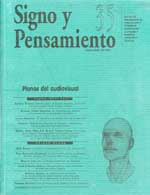Abstract
Uno de los mayores beneficios derivados de los acercamientos cognitivos y ecológicos a la teoría del cine es que nos invita a regresar a las preguntas fundamentales y a reexaminar problemáticas que fuern discutidas por un tiempo y luego fueron dejadas de lado sin resolver. Una de estas problemáticas es la atención. Se revisan algunas afirmaciones de los teóricos clasicos sobre el tema. El foco principal del artículo radica en la idea del realismo cinematográfico de André Bazin, según la cuál se nos ofrecen de maneras que se aproximan a la experiencia visual del mundo real. El autor se pregunta si este método, más que cualquier otra alternativa existente, le permite al espectador involucrarse en un nivel perceptual además de asociar símbolos y resolver problemas. En otras palabras, si este método permite una satisfacción momento a momento de una experiencia activa y en proceso que, de otra manera, disfrutamos en nuestra interacción con el mundo natural. El autor propone que esta pregunta puede responderse por medio de investigación empírica.This journal is registered under a Creative Commons Attribution 4.0 International Public License. Thus, this work may be reproduced, distributed, and publicly shared in digital format, as long as the names of the authors and Pontificia Universidad Javeriana are acknowledged. Others are allowed to quote, adapt, transform, auto-archive, republish, and create based on this material, for any purpose (even commercial ones), provided the authorship is duly acknowledged, a link to the original work is provided, and it is specified if changes have been made. Pontificia Universidad Javeriana does not hold the rights of published works and the authors are solely responsible for the contents of their works; they keep the moral, intellectual, privacy, and publicity rights.
Approving the intervention of the work (review, copy-editing, translation, layout) and the following outreach, are granted through an use license and not through an assignment of rights. This means the journal and Pontificia Universidad Javeriana cannot be held responsible for any ethical malpractice by the authors. As a consequence of the protection granted by the use license, the journal is not required to publish recantations or modify information already published, unless the errata stems from the editorial management process. Publishing contents in this journal does not generate royalties for contributors.


